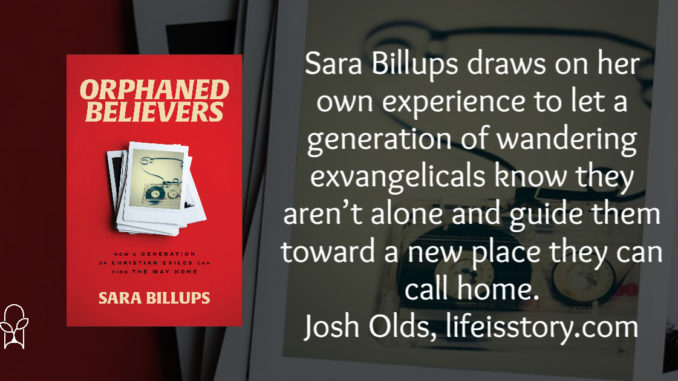
Published by Baker Books on January 24, 2023
Genres: Non-Fiction, Christian Life
Buy on Amazon
Goodreads

For a generation raised in the throes of the '80s and '90s evangelical culture wars, church was a battleground many left behind. With love and compassion, Sara Billups binds up the wounds of the broken and points them toward a new expression of faith that is motivated to make the world a better place.
I’ve met a lot of orphaned believers in the past ten years. People who grew up in the church, usually the evangelical church, and now as adults find that they can no longer be associated with it for various reasons. They moved away from the faith of their parents but they still believe in Jesus and aren’t quite sure where to go or what to do. In Orphaned Believers, Sara Billups draws on her own experience to let a generation of wandering exvangelicals know they aren’t alone and guide them toward a new place they can call home.
Billups story is like a lot of people who grew up in ‘80s and ‘90s evangelical culture. As she tells her story, I felt a wave of nostalgia even as it made me uncomfortable. Whether it’s the culture war battles, the hyperfocus on eschatology, Jews for Jesus, or anything else that formed (especially Midwestern) American evangelicalism, Billups takes readers through some of the foundational elements of the faith tradition that prefigured the social and political background of today’s evangelicalism. It’s not the first time I’ve heard this story. Philip Yancey’s memoir Where the Light Fell tells the story about the generation before Billups, offering similar insights and revelations. Jonathan Martin talks about it in his book The Road Away from God. Brian Zahnd focuses more on the current generation in When Everything’s on Fire. Billups story doesn’t take place in a vacuum and it’s not an isolated incident. Increasingly, those who have grown up in evangelicalism and become disenchanted by it are telling their stories and offering hope to others desperate to find a new path.
Orphaned Believers is divided into three parts: End Times, Culture Wars, Consumerism, and Consumerism. In her mind, these are the three things that define the evangelical experience. While a lot of book have focused on the first two, there’s not been as much discussion about the influence of consumerism/capitalism and how the “Americanness” of economic prosperity has affected evangelical belief. This was the most insightful and damning part of Billups’ work as she is able to show how ensnared by financial success and authoritarianism the faith has become.
When you get to the end of the book, after having wrestled with the faith tradition of her past for over 200 pages, Billups questions why she is still a Christian: “I am a Christian because, even though I am made to wander, I walked for miles until there was no trail left. My spirit felt at rest in a meeting of the Holy Spirit. Simply put, I am a Christian because of God’s free, infinite love.” And there’s the heart of the book. Orphaned Believers makes the case that if you grew up in and are now disenchanted by evangelicalism, Jesus is still there for you. The box of faith is much bigger than you ever imagined and God calls you into God’s family as their child.
